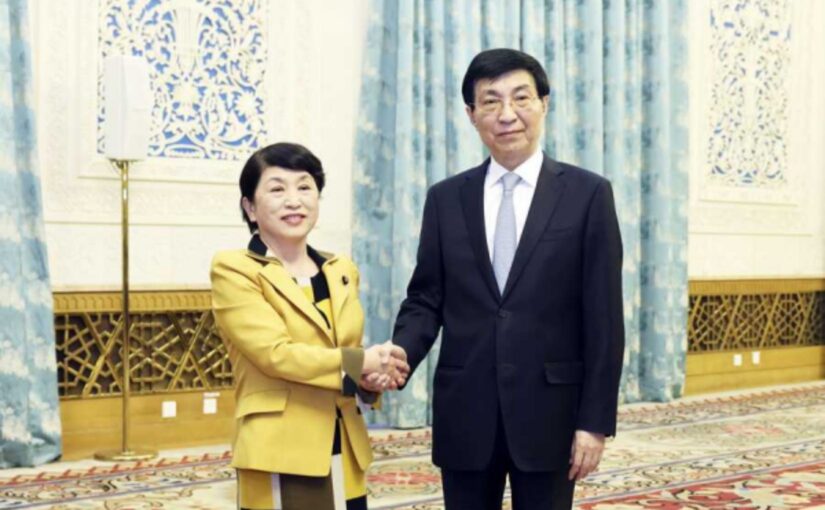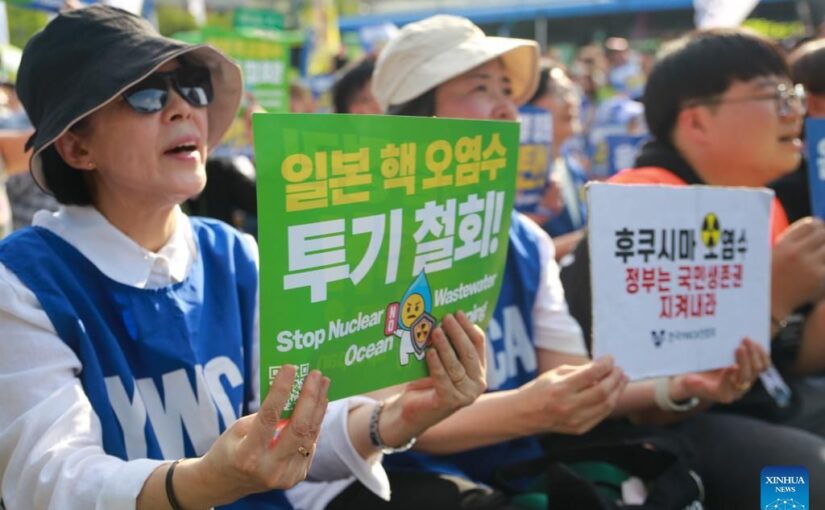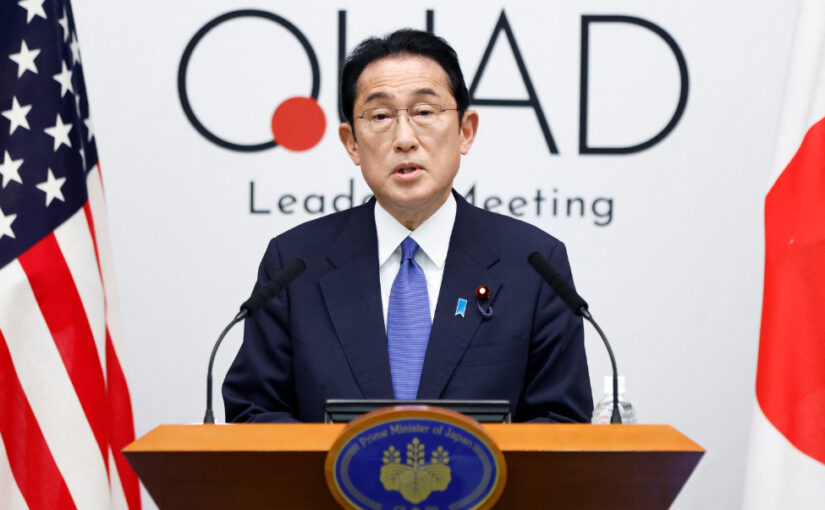A delegation of the Japanese Social Democratic Party (JSDP), headed by its leader Mizuho Fukushima, recently visited China.
Formerly known as the Japan Socialist Party, the JSDP has consistently stood for friendship with China and for peace and has actively opposed militarism and war.
On January 19, Fukushima met with Member of the Standing Committee of the Political Bureau of the Communist Party of China (CPC) Central Committee and Chairman of the National Committee of the Chinese People’s Political Consultative Conference (CPPCC) Wang Huning.
She said that the main purpose of the Social Democratic Party’s visit is to reaffirm peace and friendship between Japan and China. She said Japan had launched the war of aggression against China and caused great harm to China, for which they sincerely apologise. The Social Democratic Party is willing to promote the sound development of Japan-China relations based on the four political documents previously agreed between the two countries.
The same day she and her delegation also met with Liu Jianchao, Minister of the International Department of the CPC Central Committee (IDCPC).
Liu said that the Social Democratic Party has always attached importance to China-Japan relations. It established inter-party exchange relations with the CPC more than 40 years ago and has made important contributions to strengthening friendly cooperation between the two sides and improving and developing China-Japan relations. The Chinese side appreciates this. It is hoped that the Japanese side will abide by the one-China principle and properly handle historical issues as well as issues such as the discharge of the nuclear-contaminated water from the Fukushima Daiichi nuclear power station into the ocean. The CPC is willing to strengthen communication and exchanges with the Social Democratic Party, promote exchanges between legislatures and non-governmental organisations, as well as people-to-people and cultural exchanges, including in media and other fields, and strive to bring China-Japan relations back to the track of healthy development.
Mizuho Fukushima said that the Social Democratic Party has long adhered to the concept of cherishing peace and opposing war, and is committed to promoting Japan-China friendship. Last year, Prime Minister Kishida met with President Xi Jinping, reaffirming the decision to comprehensively advance bilateral ties with the commitment to promoting a strategic relationship of mutual benefit, adhere to the principles established in the four political documents between Japan and China, and bring important opportunities to Japan-China relations. The Social Democratic Party is deeply encouraged by this and is willing to work with the CPC to promote closer economic cooperation and people-to-people and cultural exchanges between the two countries and build a future-oriented Japan-China relationship. The Social Democratic Party, she added, opposed the discharge of nuclear-contaminated water into the ocean.
Fukushima also said: “The delegation visited the Museum of the War of Peoples Resistance Against Japanese Aggression on January 18th, and expressed deep apologies for Japan’s war of aggression against China, which caused severe harm to the Chinese people. On behalf of the Social Democratic Party, I pledged ‘no more war between Japan and China’, opposed the implementation of Japan’s new security strategy, which is a ‘war bill’, and opposed lifting bans on exercising the right of collective self-defence. I believe that Japan should not prepare for war but build peace. The Social Democratic Party hopes to strengthen friendly relations with the CPC and work together to promote the development of Japan-China relations, deepen mutual understanding and trust among Northeast Asian countries, and promote an Asian community with a shared future.”
The following articles were originally published on the websites of the Chinese Foreign Ministry and the IDCPC.
Wang Huning Meets with a Delegation of the Social Democratic Party of Japan
On January 19, 2024, Member of the Standing Committee of the Political Bureau of the Communist Party of China Central Committee and Chairman of the National Committee of the Chinese People’s Political Consultative Conference (CPPCC) Wang Huning met with a delegation led by Head of the Social Democratic Party of Japan Mizuho Fukushima in Beijing.
Wang Huning said that President Xi Jinping met with Prime Minister Fumio Kishida in November last year, and the leaders of the two countries reiterated their commitment to the principles and consensus stipulated in the four political documents between China and Japan, and reaffirmed the positioning of comprehensively advancing a strategic relationship of mutual benefit between China and Japan. He expressed the hope that the two sides will view each other’s development in an objective and rational manner in the spirit of “drawing lessons from history and opening up the future”, respect each other’s core interests and major concerns, and promote the building of a China-Japan relationship that meets the demands of the new era. The CPPCC National Committee is willing to strengthen contact with Japan and make positive contributions to this end.
Mizuho Fukushima said that the main purpose of the Social Democratic Party’s visit is to reaffirm peace and friendship between Japan and China. She said Japan had launched the war of aggression against China and caused great harm to China, for which they sincerely apologize. The Social Democratic Party is willing to promote the sound development of Japan-China relations based on the four political documents between the two countries.
Shi Taifeng and Wang Dongfeng, among others, were present at the meeting.
Liu Jianchao Meets with a Delegation of the Social Democratic Party of Japan
Liu Jianchao, Minister of the International Department of the CPC Central Committee (IDCPC), met here today with a delegation led by Mizuho Fukushima, Leader of the Social Democratic Party of Japan.
Liu said, the Social Democratic Party has always attached importance to China-Japan relations. It established inter-party exchange relations with the CPC more than 40 years ago, and has made important contributions to strengthening friendly cooperation between the two sides and improving and developing China-Japan relations. The Chinese side appreciates this. Last November, President Xi Jinping met with Prime Minister Fumio Kishida in San Francisco, US, and had in-depth exchanges on how to build a China-Japan relationship that can meet the requirements of the new era. Both sides must always abide by the principles established in the four political documents between China and Japan, maintain the foundation for the development of China-Japan relations, proceed from the overall situation, and act on the political consensus of viewing each other as cooperative partner and not posing any threat to each other. It is hoped that the Japanese side will abide by the one-China principle and properly handle historical issues as well as issues such as the discharge of the nuclear-contaminated water from the Fukushima Daiichi nuclear power station into the ocean. We are willing to strengthen communication and exchanges with the Social Democratic Party, promote exchanges between legislatures, non-governmental organizations, people-to-people and cultural exchanges, media and other fields, and strive to bring China-Japan relations back to the track of healthy development.
Liu said, changes unseen in a century are unfolding at an accelerated pace, while regional peace and development are facing more instability and uncertainty. Yet the overall direction of human development and progress will not change, and the overall trend toward a shared future for the international community will not change. Currently, Asia is at an important juncture in its development and revitalization. China will continue to promote high-quality development, adhere to high-level opening up, and promote Chinese modernization on all fronts. China and Japan are the two largest economies in Asia. The two countries shoulder important responsibilities for peace and prosperity in the region and the world at large. It is hoped that both sides will focus on respective long-term interests and regional interests, and make positive contributions to building an Asian community with a shared future.
Mizuho Fukushima said, the Social Democratic Party has long adhered to the concept of cherishing peace and opposing war, and is committed to promoting Japan-China friendship. Last year, Prime Minister Kishida met with President Xi Jinping, reaffirming the decision to comprehensively advance bilateral ties with the commitment to promoting a strategic relationship of mutual benefit, adhere to the principles established in the four political documents between Japan and China, and bring important opportunities to Japan-China relations. The Social Democratic Party is deeply encouraged by this and is willing to work with the CPC to promote closer economic cooperation and people-to-people and cultural exchanges between the two countries and build a future-oriented Japan-China relationship. The Social Democratic Party opposed the discharge of nuclear-contaminated water into the ocean.
The delegation visited the Museum of the War of Peoples Resistance Against Japanese Aggression on January 18th, and expressed deep apologies for Japan’s war of aggression against China, which caused severe harm to the Chinese people. On behalf of the Social Democratic Party, I pledged “no more war between Japan and China”, opposed the implementation of Japan’s new security strategy, which is a “war bill”, and opposed lifting bans on exercising the right of collective self-defense. I believed that Japan should not prepare for war but build peace. The Social Democratic Party hopes to strengthen friendly relations with the CPC, and work together to promote the development of Japan-China relations, deepen mutual understanding and trust among Northeast Asian countries, and promote an Asian community with a shared future.
Sun Haiyan, Vice-minister of the IDCPC, Kunio Arakaki, deputy head of the Social Democratic Party of Japan and Member of the House of Representatives, Yuko Ohtsubaki, deputy head of the Social Democratic Party of Japan and Member of the House of Councillors, and others were present.



